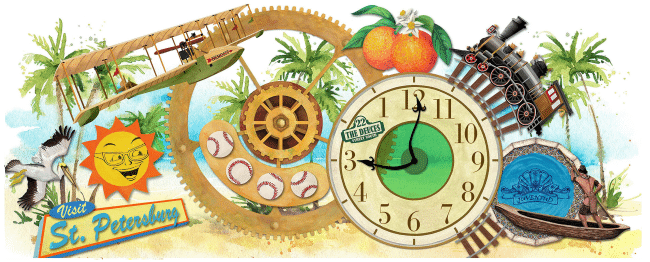
Iconic Clock Mural Coming to the St. Petersburg Museum of History
Not all clocks run clockwise. Especially in St. Petersburg.
A collaborative effort by St. Pete resident and Oxford student Jackson Willis and Creative Arts Unlimited is bringing what will be one of the Sunshine City’s most iconic and unusual murals to the waterfront.
Willis, mastermind of the design, presented the concept to Creative Arts Unlimited – nationally known for award-winning museum exhibits. Creative Arts built on Willis’s idea to develop a multi-dimensional mural featuring an innovative mechanical clock as its centerpiece, and enlisted the popular Vitale Brothers to paint the underlying mural.
Propellers spin, wheels turn and the clock keeps perfect time. The Fountain Clock is a combination of art and science and will fill the St. Peterburg Museum of History’s north wall facing the Vinoy Basin. This working clock is accurate, though runs counterclockwise to express the historical theme. The mural invites visitors to travel back through time, into the history of our dynamic city.
The mural is fabricated by Creative Arts and depicts signature elements of St. Pete’s history — with a number of moving, lighted features. The clock provides a common reference point, as did the town-clocks in historic cities and towns across the world. Most of all, the Fountain Clock invites a conversation about our local history.
“No history is straightforward, and neither is this backward clock,” said Jackson Willis. “Like any town clock, the Fountain Clock can serve as a touchstone between the generations who call this city home.”
The Fountain Clock reads the city’s history in a mirror — thus, from right to left. The story begins with the area’s Native Tocobaga residents, the distinctive Royal Palm, and the mythical Fountain of Youth – a storied fountain of restorative waters where city visitors drank, whimsically seeking longevity.
The clock’s story continues through the 1888 arrival of Peter Demens’s Orange Belt Railway — a train that rarely arrived on time! The locomotive in the Fountain Clock curls around the counterclockwise dial, struggling to meet a schedule. The mural’s historical journey continues with the birth of commercial flight, depicted by Tony Jannus’s 1914 First Flight of the Benoist.
The Fountain Clock’s dial highlights the circular forms around it: the Florida sun, stitched baseballs, mechanical wheel, Fountain of Youth pool, twin oranges, steam engine light, and circling plane propeller. A rotating Mr. Sun turns the clock’s gear, the days and years marked by sunshine. The transparent clock face symbolizes the St. Petersburg Museum of History as portal into the inner workings of the past.
The number “2” on the clock face has been replaced with “The Deuces,” referring to the vibrant African American historic community centered around 22nd Street South.
St. Pete history would not be complete without baseball. The arrival of the St. Louis Browns in 1914 set Spring Training in motion throughout Florida. The four inset baseballs, placed within the mechanical wheel and angled in an arc, mimics a pendulum’s swing. Baseball is one of the few sports played without a clock, and so America’s Pastime is a “timeless” game.
Lastly, the back-lit clock features Mr. Sun’s welcoming smile, which illuminates from low on the eastern horizon. He rises over the Bay, shinning day in and day out, every season of the year.
“My hometown is a modern art city founded on an uncommon and layered history, a sun patch shared by far-flung visitors and diverse residents,” said Willis. “I hope the Fountain Clock shows the pull of St. Petersburg’s past on its present and engages conversations about our local stories.”
The Fountain Clock is expected to begin ticking Spring, 2023.
Photo Credit: St. Petersburg Museum of History
Date Posted: January 5, 2023

